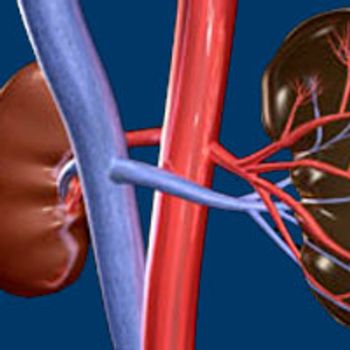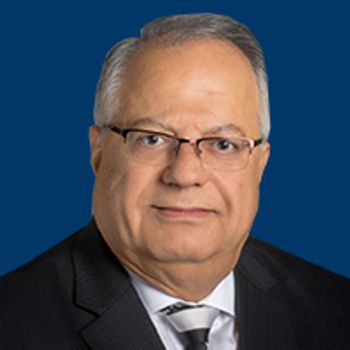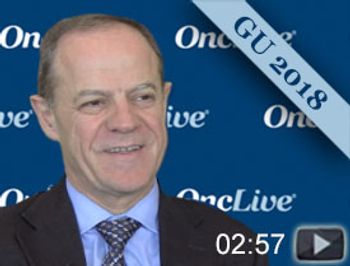
Single-agent pembrolizumab (Keytruda) showed encouraging antitumor activity as first-line treatment in patients with non-clear cell renal cell carcinoma, especially in those with papillary or unclassified histology.

Your AI-Trained Oncology Knowledge Connection!


Single-agent pembrolizumab (Keytruda) showed encouraging antitumor activity as first-line treatment in patients with non-clear cell renal cell carcinoma, especially in those with papillary or unclassified histology.

Evan Y. Yu, MD, highlights 2 key studies with PARP inhibitors in metastatic castration-resistant prostate cancer and discussed challenges that need to be addressed in this space in order to further progress.

Arlene O. Siefker-Radtke, MD, professor, Department of Genitourinary Medical Oncology, Division of Cancer Medicine, The University of Texas MD Anderson Cancer Center, discusses the promise of bempegaldesleukin plus nivolumab in the treatment of patients with metastatic urothelial carcinoma.

Thomas Powles, MBBS, MRCP, MD, director, Barts Cancer Institute, discusses durvalumab in combination with a MET inhibitor in the treatment of patients with papillary renal cancer.

The overall response rate achieved with with the combination of savolitinib and durvalumabin in patients with metastatic papillary renal cell carcinoma in the phase II CALYPSO study did not meet the prespecified criterion for further investigation of the regimen.

The combination of pembrolizumab (Keytruda) and cabozantinib (Cabometyx) has antitumor activity in patients with previously treated metastatic renal cell carcinoma and is tolerated at their separate approved doses for this indication.

Sacituzumab govitecan exhibited significant clinical activity in an open-label, single-arm phase I/II basket study of patients with heavily pretreated, relapsed/refractory metastatic urothelial cancer.

Arpita Desai, MD, medical oncologist, University of California, San Francisco Helen Diller Comprehensive Cancer Center, discusses the rationale for testing MRI functional imaging for bone metastases in men with castration-resistant prostate cancer.

Toni Choueiri, MD, director, Lank Center for Genitourinary Oncology, director, Kidney Cancer Center, Jerome and Nancy Kohlberg Associate Professor of Medicine, Harvard Medical School, Dana-Farber Cancer Institute, discusses avelumab/axitinib data in renal cell carcinoma.

In a real-world setting, patients with metastatic castration-resistant prostate cancer who received radium-223 dichloride with abiraterone acetate in a layered fashion experienced a lower rate of symptomatic skeletal events compared with those who received the treatments concurrently.

The addition of enzalutamide (Xtandi) to androgen deprivation therapy significantly prolonged radiographic progression-free survival compared with ADT alone in men with metastatic hormone-sensitive prostate cancer.

Darolutamide added to androgen deprivation therapy significantly improved metastasis-free survival compared with placebo plus ADT in patients with nonmetastatic castration-resistant prostate cancer enrolled in the phase III ARAMIS trial.

Arjun V. Balar, MD, assistant professor, Department of Medicine, director, Genitourinary Medical Oncology Program, NYU Langone’s Perlmutter Cancer Center, discusses the rationale for the KEYNOTE-057 study in patients with non–muscle invasive bladder cancer.

Scott T. Tagawa, MD, Richard A. Stratton Associate Professor in Hematology and Oncology, associate professor of clinical medicine & urology at Weill Cornell Medicine, associate attending physician, NewYork-Presbyterian–Weill Cornell Medical Center, discusses sacituzumab govitecan in the treatment of patients with urothelial carcinoma.

Nivolumab combined with low-dose ipilimumab continued to demonstrate strong responses and a survival benefit at 30 months’ follow-up as a frontline treatment for patients with intermediate- and poor-risk advanced renal cell carcinoma.

The combination of pembrolizumab (Keytruda) and axitinib (Inlyta) was associated with a significantly longer progression-free and overall survival compared with sunitinib (Sutent) in treatment-naïve patients with clear cell metastatic renal cell carcinoma.

African-American men with metastatic castration-resistant prostate cancer treated with novel hormonal therapies—namely abiraterone acetate or enzalutamide—lived 20% longer than their Caucasian counterparts.

The novel targeted radiation therapy lutetium-177 PSMA-617 showed strong clinical activity and the potential to improve survival in heavily pretreated men with PSMA-positive metastatic castration-resistant prostate cancer.

Antitumor activity of the combination of axitinib (Inlyta) and pembrolizumab (Keytruda) is superior to that expected from axitinib or PD-1/PD-L1 pathway inhibitor monotherapy in treatment-naïve patients with advanced renal cell carcinoma.

Cabozantinib (Cabometyx) improved progression-free survival as initial systemic therapy across subgroups of patients with intermediate- and poor-risk advanced RCC enrolled in the randomized phase II CABOSUN trial.

Erdafitinib showed responses in more than one-third of patients with pretreated metastatic or unresectable FGFR alteration-positive urothelial carcinoma.

Susan F. Slovin, MD, PhD, a medical oncologist at Memorial Sloan Kettering Cancer Center, discusses a multicenter, randomized, controlled trial comparing the occurrence of major adverse cardiovascular events in patients with prostate cancer and cardiovascular disease receiving degarelix, a GnRH receptor antagonist, or leuprolide, a GnRH receptor agonist.

Two-year follow-up data showed sustained improvements in overall survival with pembrolizumab over chemotherapy in pretreated patients with locally advanced or recurrent urothelial cancer.

James Gulley, MD, PhD, chief, Genitourinary Malignancies Branch, and director, Medical Oncology Service, at the National Cancer Institute, discusses a phase II study of olaparib (Lynparza) and durvalumab (Imfinzi) in metastatic castration-resistant prostate cancer (mCRPC) in an unselected patient population, presented at the 2018 Genitourinary Cancers Symposium.

Joaquim Bellmunt, MD, PhD, associate professor of medicine, Harvard Medical School, director, Bladder Cancer Center, Dana-Farber Cancer Institute, discusses 2-year follow-up results from the phase III KEYNOTE-045 trial of pembrolizumab (Keytruda) versus chemotherapy in recurrent, advanced urothelial carcinoma during the 2018 Genitourinary Cancers Symposium.

Guru Sonpavde, MD, director of Bladder Cancer at Dana-Farber Cancer Institute, discusses a phase IIIb safety study of fixed-dose durvalumab (Imfinzi) and tremelimumab in patients with advanced urothelial carcinoma.

Data from the first 13 evaluable patients enrolled in a phase II study of SM-88 showed a reduction in circulating tumor cells, a slowing of prostate-specific antigen increase, and delayed radiographic progression of disease in nonmetastatic prostate cancer.

The PARP inhibitor olaparib appeared to complement the antitumor activity of the PD-L1 inhibitor durvalumab in unselected men with metastatic castrate-resistant prostate cancer, according to findings from a phase II study presented at the 2018 Genitourinary Cancers Symposium.

Elizabeth Plimack, MD, director of Genitourinary Clinical Research at Fox Chase Cancer Center, discusses 2 studies reported at the 2018 Genitourinary Cancers Symposium in patients with nonmetastatic M0 castration-resistant prostate cancer (CRPC).

Monika Joshi, MD, assistant professor, Penn State Hershey Medical Center, discusses a phase Ib study of durvalumab (Imfinzi) and radiation therapy (DUART) followed by adjuvant durvalumab in patients with urothelial carcinoma.